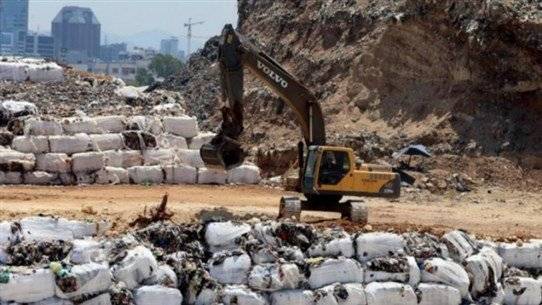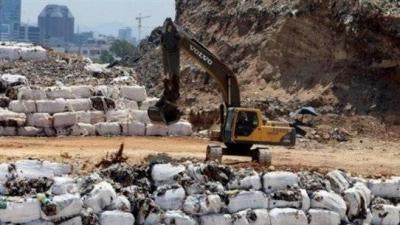The actual number of hepatitis A (jaundice) infections is continuously rising. Warnings are increasing about the prospect of an unprecedented rise in cases, one cause being groundwater contamination. Coincidentally, the alarm is once again being sounded regarding the waste crisis after the Cabinet approved strategic orientations for the integrated management of solid waste in Lebanon last month, the most notable of which is "developing existing sanitary landfills and establishing modern sanitary landfills." Is there a connection or reason for panic? The Cabinet's decision, which did not explicitly mention the proposed new landfill sites on May 20, 2022, numbered 67, came as a continuation of a previous decision made last February, during which the government approved the plan presented by the Minister of Environment, tasking him with taking the necessary steps for its implementation. This decision faced environmental objections and condemnation about the possible leakage of waste leachate contaminating springs, especially after it was discovered that the proposed new sites are in Naameh and Biasha, which had previously faced strong opposition from residents, in addition to Ghushta and Abu Mi'zan, which are only a few kilometers from the Jeita spring. Opinions vary as usual between official, environmental, and medical perspectives.
## Strategy and Directions
In an interview with "Nidaa al-Watan," the caretaker Minister of Environment, Dr. Nasser Yassin, described the proposed plan from the Ministry of Environment to address around a thousand random dumps scattered across Lebanon, mostly located outside major cities. He explained: "These random dumps, resulting from poor management of the solid waste issue over the years, are always at risk of igniting, causing dangerous emissions that lead to health problems and cancer, along with groundwater pollution, as well as the risk of wildfires in nearby forests and environmental degradation." However, despite the urgency of the situation, no radical solution has been presented to date to address the waste crisis. Integrated solid waste management, according to Yassin, goes through several stages which he summarized in seven strategic directions as outlined in the ministry's plan:
1. Implementing Law No. 80/2018 by activating the regulatory and oversight role of the Ministry of Environment;
2. The necessity of enhancing the decentralized management of waste and empowering local authorities and municipalities to play an active role in the sorting process since they represent the first line of defense in managing the crisis;
3. Adopting and promoting circular economy principles and organizing types and pathways of waste each separately, which means source sorting;
4. Developing and operating secondary sorting and composting centers at the regional and city levels, which is a crucial stage given the lack of complete adherence to primary home sorting;
5. Following the completion of the previous four directions, there is a need to organize the production of alternative fuel extracted from non-recyclable waste, culminating in developing currently existing sanitary landfills and establishing modern sanitary ones, as well as closing and rehabilitating random dumps.
## Assurances but…
Are there alternative solutions to landfills? Yassin answers: "Unfortunately, not all municipalities are doing their part in the initial sorting process. Incineration is one treatment method, but its cost is high and its environmental impacts are harmful. Moreover, the process of selling waste is one of the myths that have circulated in Lebanese culture because it is a trade governed by strict international laws and treaties, in addition to the topic's ethical aspects. While we await the deepening of the culture of source sorting, which requires years of behavioral change, we must resort to the more integrated solutions despite the lack of community trust in us." Yassin also points out that the Jeita landfill is expected to reach its capacity in about a year. "Proactive solutions are necessary considering that the likelihood of business continuity could extend, thus I will not accept a mountain of waste in Metn or on Lebanese beaches and shores." In summary, the decision consists of proposals for landfill locations, all of which will be subjected to an environmental impact study to determine their effects on groundwater and geological conditions, as well as the acceptance of the idea by local residents. They are meant to replace previously existing random dumps or old quarry sites that were studied preliminarily before selection, with the emphasis that each area should have its own landfill, according to Yassin.
However, the assurances made by Yassin and his insistence on considering other sites if the proposed landfills are found to be inaccurate did not prevent environmental activists from having a different opinion.
## Time Bombs?
We asked the president of Land Association - Lebanon, Mr. Paul Abi Rached, who initially expressed his astonishment at the Cabinet decision, which only addressed landfills in the Beirut and Mount Lebanon areas without mentioning others in the Bekaa, North, or South. He questioned the reasons that led to the lack of clarity regarding the names of sites, pointing out that adopting existing landfills and proposing four new ones means renewing the operating licenses for the Costa Brava and Jeita landfills.
Abi Rached added: "We were not consulted prior to the decision, knowing that we, as the Land Association of Lebanon, represent associations in the coordination committee formed by the Ministry of Environment to manage the waste issue." He clarified the impossibility of converting quarry sites into sanitary landfills due to the previous excavation of layers of soil, facilitating the leakage of leachate into groundwater. The proposed new landfills, according to Abi Rached, are very dangerous time bombs. The Ghushta and Abu Mi'zan landfills are only a few kilometers from the Jeita spring, which supplies 70% of Beirut. As for the Naameh and Biasha landfills, they previously faced intense opposition from residents due to the foul odors they cause in neighboring residential areas. He added that proposing these sites is akin to "stirring a hornet's nest... Are we at a point where we propose a landfill near homes just due to negligence in applying the initial and secondary sorting processes properly?"
Regarding the principle of decentralization in waste management, Abi Rached noted that it is not possible for each district to have its own landfill since, after the sorting and composting processes, waste must be transported according to its type to specific places: construction waste to one site, electronic waste to another, and so on. So what is the idea behind proposing Biasha landfill for Chouf, Naameh for Aley, Costa Brava for Baabda, Abu Mi'zan for Metn, Ghushta for Kesrouan, and Habline for Jbeil? "The solution would be through declaring a state of emergency and forcing municipalities on one hand to establish sorting and transfer centers, while also compelling citizens on the other to sort their waste at home," he concluded. All this is to be done within exceptional measures monitored by municipal staff or police, resulting in sorting processes being controlled and reducing the percentage of waste diverted to landfills from 90% to 10%, thus decreasing the need for the latter.
## Discouraging Experiences
For his part, MP Razi al-Hajj, a member of the Strong Republic Bloc, stated in a call with "Nidaa al-Watan" that the problem with the decision does not relate to its general principle but rather to its implementation. He questioned: "What guarantees are there regarding ensuring that the landfill is sanitary and that recyclable materials won't also be taken there? We have a clear picture of landfills that were termed 'sanitary’ previously operated by the state, such as in Bourj Hammoud, Jeita, and Bouchrieh, but they did not meet the conditions." The discussion, according to al-Hajj, is not technical but requires assurances of correct implementation of the project in adherence to the specifications, especially since some proposed landfills are at a higher elevation than the Jeita spring that supplies a large part of Beirut and Mount Lebanon. He added, "We have the right to express reservations, know the details, and oppose the decision, not from a point of absolute opposition but because past experiences are unpromising." The proposed solutions, according to al-Hajj, are merely unsustainable plans that postpone the problem rather than solve it. The landfills are not the most suitable and final solution; rather, focus should be on sorting centers and forcing people to implement them. The negligence first arises from local authorities, since "how can one allow scavengers to collect plastic and cardboard materials and sell them, while these materials could have been a financial resource for municipalities if managed correctly?" While al-Hajj fears the disaster will simply be moved from one place to another in the absence of any radical solution, he mentioned the possibility of filing a review with the State Consultative Council to reconsider the decision. Can the government start implementing it without revisiting it, given that it is a caretaker government? The answer from al-Hajj is: "As long as the decision was issued in the last session of the Council of Ministers before the government entered the caretaker phase, it can be implemented but in accordance with the procedures, meaning referring it to the tender department, unless it goes towards contracts by mutual consent, which I somewhat excluded."
## Beware of Health Complications!
Whether the decision is implemented or not, unfortunately, the pollution of water is not a new disaster. It does not cease to infiltrate children's bodies, and the increasing cases of jaundice are merely evidence of that. What does medicine say in this regard?
"Nidaa al-Watan" contacted pediatrician Dr. Thuraya Alameddine, who noted that one of the main causes of water pollution is the mixing of foreign materials with groundwater or surface water or the leakage of thermal and radioactive energy, leading to changes in their functions. These waters, which can easily enter a child's body through drinking, bathing, or tooth brushing, or even from the food consumed, lead to countless diseases including dysentery, cholera, typhoid fever, trachoma, salmonella, E. coli, jaundice, or even ear infections, which are common symptoms during swimming season. While global statistics indicate that a significant number of children die each year due to contaminated water, Alameddine recommends, "Sterilizing water by boiling it for no less than five minutes, which is the safest way to eliminate a significant amount of bacteria and viruses." As for the symptoms of infection, they include a rise in body temperature, vomiting, nausea, loss of appetite, fatigue, and sometimes pain in the liver area, along with jaundice that may appear under the skin and in the whites of the eyes. Alameddine concludes with a warning: "Symptoms become more pronounced with age and can develop complications leading to liver failure and sudden reduction in its functions." Vaccines are absent in clinics, the prices of fresh drinking water are soaring, and remaining uncontaminated springs are at risk from waste plans. Caution necessitates keeping an eye on the infection rate and another on developments in the landfill file at the same time.




